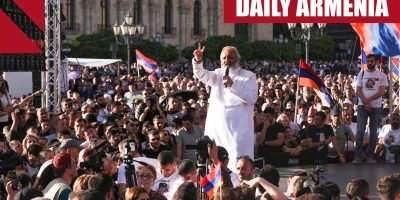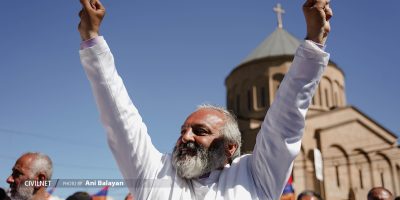By Mark Dovich
Two reports published Tuesday by Amnesty International underscore the particularly heavy toll the conflict in and around Karabakh has taken on older people, both Armenian and Azerbaijani.
“The conflict in Nagorno-Karabakh highlights the unique risks that older people face in armed conflicts. Often the last to flee, they also suffer the consequences of war for decades on end,” said Laura Mills, a researcher with Amnesty International, a prominent international NGO with a strong human rights focus.
“In both Armenia and Azerbaijan, older people have struggled to rebuild their lives in displacement – yet their loss of independence and dignity is treated as inevitable or irrelevant,” she added.
Older Armenians living in and around Karabakh when the war began in 2020 tended to stay in their homes, often due to physical or mental health problems, as well as a strong sense of attachment to their communities.
As a result, they became disproportionately vulnerable to violence, with Amnesty International concluding that “on the ethnic Armenian side, more than half of civilian deaths were among older people.”
Some of the older Armenians who were killed in the war were subject to beatings and torture before death and mutilation afterward, according to the report, whose preparation involved in-person and remote interviews with 69 older Armenians and their relatives. The interviews were conducted last November.
“Older men appear to have been targeted because Azerbaijani soldiers believed they had participated in Armenia’s war effort during the 1990s,” Amnesty International noted.
On the Azerbaijani side, the challenges facing the over 500,000 people expelled in the 1990s from Karabakh and the seven surrounding districts are even more acute for older people, the organization found.
While many displaced Azerbaijanis struggle with inadequate and cramped housing, deep poverty, and high unemployment, those problems are all sharper for the older generation, who often have physical mobility issues and face entrenched ageism in the labor market.
Older Azerbaijanis are also more likely to express a desire to return to their former homes in and around Karabakh, having a deeper attachment to the region than younger generations, according to Amnesty International, which interviewed 40 older Azerbaijanis in person last November to prepare the report.
That desire to return to the region makes older Azerbaijanis especially vulnerable to the barriers facing all displaced Azerbaijanis wishing to return, notably landmines and dilapidated infrastructure.
Following in-depth research into the problems facing older Armenians and Azerbaijanis in the Karabakh conflict, Amnesty International released a long list of recommendations to the Armenian and Azerbaijani governments, “the de facto authorities in Nagorno-Karabakh,” and Russia, as well as the United Nations and the Council of Europe.
The organization urged Yerevan and Stepanakert to prioritize the protection of older persons in all Karabakh-related matters, from housing to food security to healthcare, and include them in reconstruction and peacebuilding efforts.
Likewise, it called on Baku to ensure that older displaced people have access to housing, food, and employment opportunities, as well as the opportunity for a safe and dignified return to their homes.
In addition, Amnesty International called on the Armenian and Azerbaijani authorities to fully respect international law, allow for independent and impartial investigations into alleged war crimes and other violations of international law by their forces, and compensate all victims of such violations.
The two governments should also both sign the Ottawa Treaty, a UN agreement that bans the use of antipersonnel landmines.
Russia, meanwhile, should “allow full and unfettered access to Nagorno-Karabakh for journalists, human rights organizations, and humanitarian organizations,” Amnesty International said.
The UN and other international organizations should take the experiences of and problems facing older people into account when reporting on and monitoring the situation in and around Karabakh, it added.
















